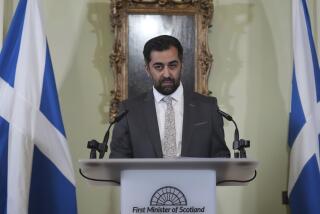A Year Later, a Wee Sense of Support for Scotland’s Lawmakers
- Share via
EDINBURGH, Scotland — After dreaming of their own government for nearly three centuries, it was probably inevitable that Scots would find the nuts-and-bolts reality of the new Scottish Parliament something less than a dream come true.
And known, as they are, for refusing to suffer fools, Scots were not likely to give rave reviews to a corps of 129 politicians, most of whom are first-time legislators.
Even so, it is striking how disappointed the Scots are with the first year of their devolved government, a year noted more for political bumbling and bickering than for the thrill of taking powers back from the English.
The symbol of the electorate’s unmet expectations is a muddy building site between the Palace of Holyroodhouse and Edinburgh Castle, where cranes are putting up the walls of a new Parliament building that is twice as large and nearly six times as expensive as originally proposed. Like the government itself, this seat of self-rule in the shadow of ancient Edinburgh Castle is taking longer to build than anyone imagined.
“The new Parliament hasn’t done much but argue about the new building,” said optician Lorna Crawford, 34. “Unfortunately, they tried to run before they could walk with this big building. The money is out of control and so people aren’t going to trust them with tax-raising powers. They’ve kind of fallen on their faces.”
According to an ICM Research poll conducted for the Scotsman newspaper in February, two-thirds of Scots felt that their Parliament had achieved only “a little” in its first year.
Admittedly, this is a short life for a political institution, but these are not the kind of reviews any politician likes to receive, much less in a place like Scotland, where the legendary outspokenness of its 5 million citizens makes politics so highly personal.
“Parliament’s just jobs for the boys,” grumbled Gregor Paton, 70. “I don’t like it at all.”
First Minister Bears Brunt of Criticism
Donald Dewar, the former secretary of state for Scotland in London who became first minister in Edinburgh, has borne the brunt of much of the criticism. He admits that the job of setting up a devolved government has been far more difficult than he expected.
“It is much more contentious. The storms blow with greater ferocity,” Dewar said in a recent interview. “We’re on our own. We’ve got to develop policy and make a government that wasn’t there.”
This is quite an admission from a thick-skinned Scot such as Dewar, who might as well list on his resume that Britain’s Lord Chancellor ran away with his wife, as locals routinely mention it when describing him.
But there also is good news for the leaders of the Scottish government: In less than a year, it has established itself as a permanent fixture for the vast majority of Scots. More than two-thirds of voters support the existence of a Scottish parliament, according to the ICM poll.
The issues are whether it can do a better job or if its limited powers should be expanded, but not whether it is here to stay.
Many Scots view the English as conquerors and resent their domination. Scottish voters grew weary of Westminster’s rule during the last Tory regime, when they voted Labor and yet found themselves governed by the Conservatives for 18 years.
Soon after his election in 1997, Labor Prime Minister Tony Blair called a Scottish referendum on the creation of a parliament, which was overwhelmingly approved. It was part of a broader policy of devolving power over local affairs to local governments in Northern Ireland, Scotland and London to satisfy popular demand for a more direct say in their affairs.
The Scottish Parliament has limited authority. It controls a budget of only about $27 billion and can raise or lower income taxes by just three pence on the pound, with 100 pence to the pound. It may make laws governing issues such as health, education, housing, tourism and transportation, but foreign, defense and economic policy remain with the British Parliament, as would any constitutional changes.
For the time being at least, the devolved government seems to be satisfying Scottish nationalist aspirations. A majority of Scots say they are content to have more autonomy within Britain.
“This has put the nationalist genie back into the bottle. There is no evidence of rising support for independence,” said John Curtice, professor of political science at Strathclyde University in Glasgow.
Scottish National Party leader Alex Salmond does not agree, of course. His party has the largest opposition bloc in the 129-member Parliament and is a constant critic of the Labor-Liberal coalition running the government.
He doesn’t miss an opportunity to portray Dewar as Blair’s puppet. Even as Dewar lay in the hospital recovering from heart surgery to repair a leaky valve recently, Salmond charged that London would step in to run Scotland for him.
“We’re doing fine, finding our feet, putting the executive under pressure,” Salmond said. “That’s the role of the Parliament, after all--to subject the government to democratic scrutiny.”
When voters tire of the current leadership, Salmond figures that he’ll be well positioned to receive their votes. Then he will call a referendum on independence, which would not be binding but would put pressure on London to let go of Scotland if the measure passed.
“Scotland will be independent within the next 10 years,” he predicted. “This is as nearly inevitable as anything becomes.”
The reason, he explained, is that the European Union will assume more decision-making powers over issues such as monetary policy and defense, and Scotland will demand more powers over areas such as justice and taxation, leaving nothing left for London.
Despite Salmond’s confidence, most Scottish voters don’t yet distinguish between Dewar’s executive and the Scottish Parliament. They simply see a legislature made up of a majority of inexperienced politicians whose first job as members of the Scottish Parliament was to set their own salaries and start-up costs--a fact reported in the Scottish press as “feathering their nests.” They then went on to do battle over the skyrocketing price of the new Parliament building and narrowly approved continuing the 2-year-old project.
In fact, the Scottish Parliament has taken steps to distinguish its policies from Westminster and to respond to Scottish public opinion.
The Liberal Democrats had promised to eliminate the $1,600-a-year university fees recently imposed by the national Labor government and broadly opposed in Scotland. Although Dewar tried to keep the fees, the governing parties reached a compromise, scrapping them in favor of a post-university payback scheme to support poorer students.
Other bills have been passed. One cut energy costs for the elderly, another allowed relatives to assume authority--similar to a power of attorney--for incapacitated family members, and another prevented a court from selling off a debtor’s possessions.
A Few Missteps for the New Government
But there also have been some high-profile blunders. In particular, Dewar’s government announced that it would eliminate a ban on the promotion of homosexuality in schools that few people had even realized existed. The announcement provoked a campaign to retain the prohibition by religious conservatives, and plunged the government into an unwanted debate over “family values.”
Dewar said he will proceed with the bill nonetheless and says he has enough votes to pass it.
“We actually think it is the right thing to do,” Dewar said. “It [the ban] is rather mean-spirited and discriminatory. No one believes it is an essential safeguard.”
There also was a “cash for access” scandal in which a private lobbying firm appeared to promise its clients access to Labor ministers. The ministers were cleared of wrongdoing but were bruised by the scandal.
And Dewar lost two aides, one caught drunk in his car with a prostitute and another forced to resign over misleading leaks to the media.
First year missteps aside, Scots remain hopeful about the future of their devolved government. They concede that building a new parliament and executive takes time, and say they enjoy more access to their lawmakers now than ever.
“I’m really proud of the fact we’ve got a parliament,” university student Neale Duncan said. “A lot of issues are Scottish and shouldn’t be decided in London. Hopefully, one day we’ll get a parliament with full powers.”
More to Read
Sign up for Essential California
The most important California stories and recommendations in your inbox every morning.
You may occasionally receive promotional content from the Los Angeles Times.













